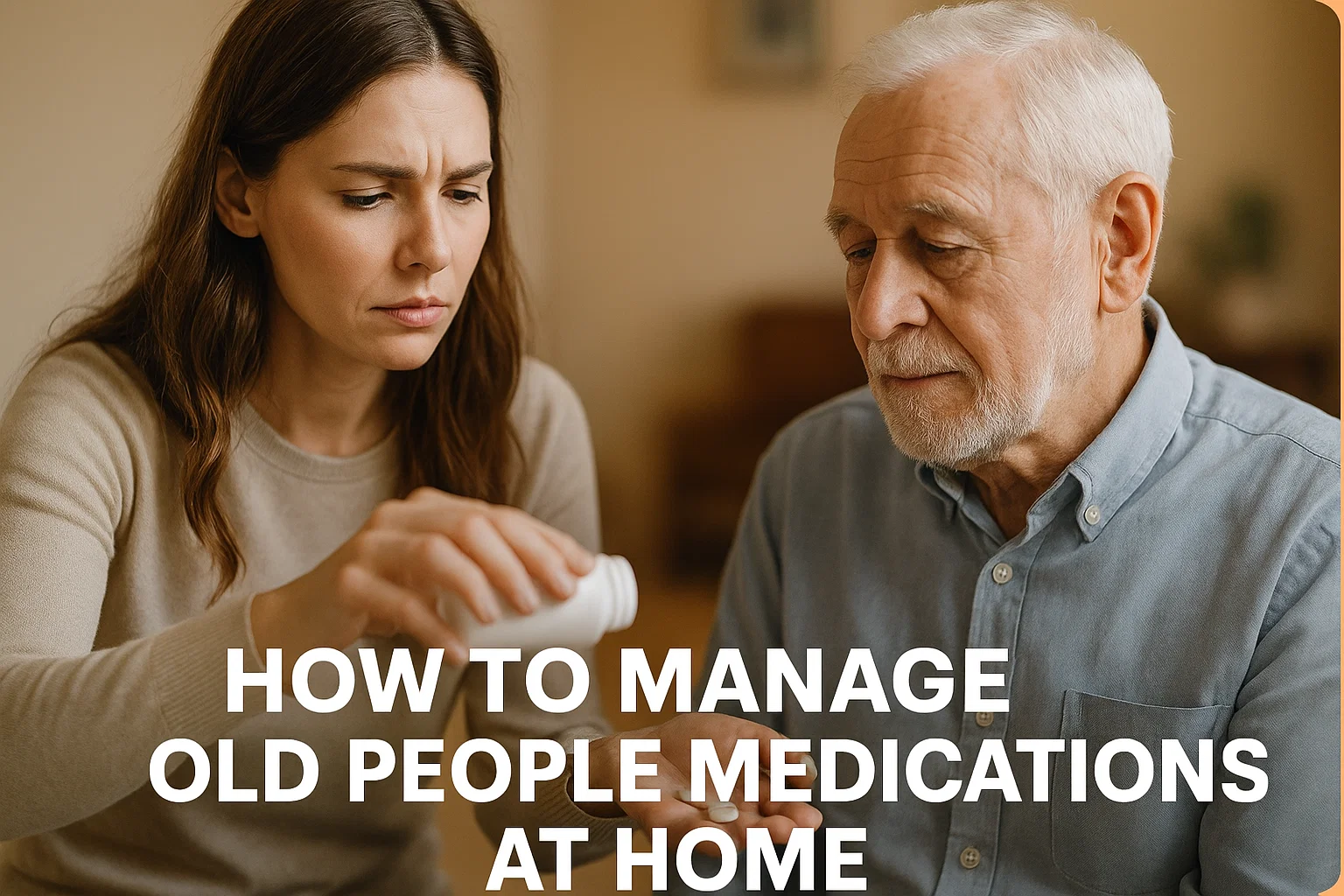How to Manage Old People Medications at Home
If you are caring for an older adult at home, you likely know how overwhelming it can be to manage medications. With several prescriptions, over-the-counter pills and a daily supplement or two, it can be hard to keep track of what has been taken, and when. But if you miss a dose or mix them up even once, the health complications can be severe.
Older adults are more likely to be hospitalized for medication-related problems than any other age group, the C.D.C. says. That’s why being able to manage old people medications at home is critical. Whether you’re taking Senior Care of an older family member or just assisting a loved one in getting organized, this guide will give you tips and demonstrate methods that work for helping you to keep medications safe and your schedule on track.
Common Challenges with Medication Management
Before creating a system, it’s helpful to know why senior medication management can be so complicated.
Polypharmacy Risks
Many older adults have more than one chronic condition, such as diabetes, heart disease, arthritis. This frequently results in polypharmacy — the use of five or more medications at a time. The risk, however, is that even if every prescription is needed, taking multiple medications together may lead to dangerous interactions or side effects. For instance, blood thinners can cause excessive bleeding if combined with some painkillers.
Memory and Cognitive Decline
With age-related Memory Loss or Dementia, recalling daily dosages difficult. Older adults may inadvertently miss medications or, conversely, take a double dose. Sometimes uncertainty about how to do something (like “take with food,” or “take before bed”) prevents patients from getting the right treatment.
Vision and Dexterity Issues
Small pills and difficult-to-open bottles can be particularly hard on older adults with failing eyesight or arthritis. Labels are difficult to read, and identical-looking pills can easily be confused. Even small barriers can result in missing doses or overdoses over time.
How to Organize and Manage Senior Medications at Home
When you have an elderly person under care, you must be especially attentive to their health and routine and one of the most important duties is the management of medicine taken by that person. It can be confusing with all the prescriptions, supplements, and the over-the-counter medicines involved. Here are best practices that will assist you in organizing and managing senior medications at home without doubts and fears.
Creating a Medication Management System
In order to avoid mistakes, it’s really important to establish a system that’s easy and clear to follow. Here’s how you can do that:
Keep an Updated Medication List
Begin with a list of all your medications. Include:
- The product name of each prescription and OTC product
- Dosage and frequency
- Purpose of the medication
- Prescribing doctor’s contact information
- Keep this list on file and take it to every doctor’s visit. Update it whenever anything changes.
Use Pill Organizers or Dispensers
Pill organizers are a true no-brainer when it comes to medications. One in eight of these drugs was taken from simple, single-compartment pillboxes, when a once-a-week pillbox with compartments clearly labeled by days can prevent confusion and save time. For even more assistance, look for a pill organizer with timers or alarms that notify when it’s time for a dose.
Set Reminders
Use technology to your advantage. Daily doses can often be tracked using smartphone alarms or medication reminder apps. If your loved one does not have a smartphone, a simple printed schedule, posted in an obvious place such as the refrigerator, might suffice.
Store Medications Safely
Keep all drugs in a safe place. Skip bathroom cabinets where moisture can ruin pills. Store all medicines in their original containers with labels intact, and in a location where children and pets cannot get to them.
Best Practices for Caregivers
Whether you’re working closely with medication yourself or helping a loved one, these good habits can help make mistakes less likely:
Communicate with Healthcare Providers
Ask questions, don’t be shy. Discuss with doctors and pharmacists potential side effects, interactions and the best time of day to take each dose. If you see changes in behavior or new symptoms, tell them immediately.
Keep an Eye Out for Side Effects and Interactions
Side effects can develop gradually. Watch out for such signs as dizziness, confusion, unexplained falls and sudden fatigue. These are signs of a reaction or interaction that requires medical attention.
Document Every Dose
A list of medications can be a lifesaver, particularly if there are other caregivers. You need only record the date and time of each dose, as it is given. This establishes an accurate account and guards against double-dosing.
Involve the Older Adult
To the extent possible, involve the person you care about in med management. Providing an explanation of what each drug does and why it matters can enhance adherence and trust.
Using Technology for Medication Management
These days, technology provides a million ways to streamline prescription routines. Here are a few that are worth checking out:
Medication Reminder Apps: Apps such as Medisafe or MyMeds can generate reminders, count doses and notify a caregiver if a dose is missed.
Automatic Pill Dispensers: Available for purchase or for hire, these can be programmed to release an optimal dose when it’s time to take medication, and can sound alarms that alert you when to do so.
Telehealth Consultations: Connecting to your health care professional from home is now more convenient.
Using those tools can reduce strain on caregivers and help seniors stay independent longer.
Tips to Avoid Medication Errors
Despite all of the systems, mistakes can occur. Here are some ways to help prevent medication errors:
Double-Check Labels and Doses: Make sure to verify the name of the medicine and the dosing before administering any medication.
No Sharing of Medicine: Do not, under any circumstances, share medications, no matter how similar your symptoms are.
If You Live With a Patient: Be aware that you could carry the virus even if you have no symptoms of COVID-19. Monitor Your Medications: Make yearly appointments with a pharmacist or doctor for medication reviews, to check for duplication and outdated prescriptions.
Keep Emergency Contacts in Reach: Post your loved one’s doctor and the local poison control center numbers where they are easily accessible.
When to Seek Professional Help
Medically dealing with it can start to be really complicated or too much. If you do find yourself recognizing one of these signs in a client, it could be time to consider seeking professional help:
- Missed doses often or forget to take drug, or forget what dose you’ve taken with reminders
- Severe or declining illness
- Evidence of hoarding or refusal of necessary medications
- Options include hiring a home health aide, scheduling regular nurse visits and moving to assisted-living complexes that offer medication management.
Conclusion
Old people medications in the home are not always easy to handle, but it is one of the most important things you can do to safeguard the health of your loved one. By establishing a solid system, and being set up with modern tools and keeping in good communication with the medical professionals in your life, you can dramatically minimize the chances of a bad medication mix-up, and help your loved one stay safe and independent.
Call us now at Precious Pearls Home Care to understand how our selfless professionals can help make your family safer, easier and more comfortable. We offer quality, gentle in-house support that involves assistance with medication, daily help, and companionship.
FAQs
Store medications properly in their original containers in a cool, dry place out of the sunlight. Be sure to always store them where they are out of reach of children or animals.
Pill organizers, phone or clock alarms and a visible schedule can all help. Include them in the process so they have a sense of control.
Call your loved one’s physician or pharmacist now. If you have severe symptoms, such as difficulty breathing and/or confusion, get emergency care immediately.
Contract us at our team today to discuss in-home support service, medication management help and personalized care plan to keep your family feeling safe in their environment.






